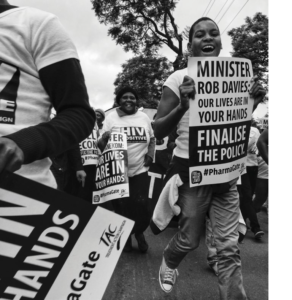Catherine Tomlinson, Yuan Qiong Hu, Julia Hill and Claire Waterhouse
Fix the Patent Laws Campaign
Full Text (PDF)
Executive Summary:
In this report, we present nine case studies that demonstrate how systemic shortcomings in South Africa’s patent laws negatively impact on access to medicines to treat a wide range of diseases in both the public and private sectors.
The case studies illustrate how a flawed system can allow pharmaceutical companies to prolong their monopoly periods in South Africa for years – and sometimes even decades – after their patent protections have expired in other parts of the world, to the detriment of millions of patients.
To prolong their periods of patent protection, companies commonly apply for multiple patents on individual medicines over time – a tactic known as evergreening. Due to shortcomings in South Africa’s laws – namely, a lack of examination for patent applications – ‘evergreening’ occurs frequently.
The result is that South Africa’s patents office grants patents that are rejected in other countries, and also grants patents that may not stand up to national patentability criteria. Additionally, patents that are overturned in other countries through opposition or legal procedures are often unchallenged or upheld by courts in South Africa.
The complexity of identifying when patent monopolies actually expire in South Africa and the conservative approach of the country’s courts in ruling on patent challenges (see explanation on page 14), disincentivises generic and biosimilar companies from launching their products.
These challenges are further compounded by slow drug registration procedures in the country (see more on page 16) that can delay and disincentivise generic and biosimilar companies from bringing their products to market when patents have expired, or when a opaque patent landscape exists.
In this report we explore how ongoing patent protection and sometimes murky patent environments inhibit the use of generic and biosimilar versions of many medicines in South Africa that are already available in other countries where patent protection was not granted, has expired, or has been overturned.
In seeking to understand how lack of access to generic and biosimilar products impacts on medicine access in the country, we have explored the accessibility of patented products in both the public and private healthcare sectors.
The vast majority of people living in South Africa, for whom private medical insurance is unaffordable and inaccessible, are dependent on the government-funded public sector for healthcare services. Only 16.2% of people living in South Africa have private insurance enabling them to access private sector care[2], which they purchase personally or receive via their employer or family members.
In exploring the accessibility of patented medicines included in our case studies, we found that medicines which remain under patent are often excluded from prescribed minimum benefits in the private sector, allowing private insurers to refuse to cover their full costs. The high costs of some patented medicines often means they are provided only under limited circumstances in the public sector, or not at all. Eight of the nine case study medicines reviewed in this report – for which generic and biosimilar products are unavailable in the country – are not procured nationally for public sector use or fully covered by private insurers. Where figures for private sector expenditure by patients and private insurers are available, the report demonstrates that huge savings could have been achieved if generic or biosimilar products (at equivalent prices to India and/or Canada) were accessible in South Africa.
In circumstances where the government and private insurers are unable to cover the high costs of medicines, it is often impossible or extremely difficult for individual patients to cover treatment costs. For these patients, lack of access to life-saving and other treatments can result in death or significantly reduced quality of life.
In this report, we hear the stories of people who are unable to – or face extreme difficulty in – accessing the medicines they need. To improve affordability and accessibility of medicines for these patients, and for all people living in South Africa, patent law reform is urgently needed.





